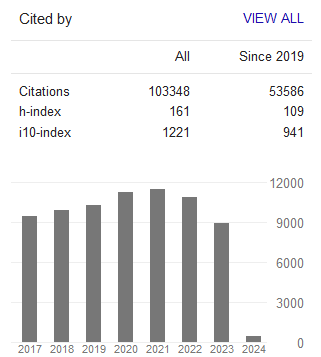Organisational Justice as a Determinant of Organisational Citizenship Behaviour in the Nigerain Work Environment: A Study of Selected Universities in the Niger Delta Region
- B. Nwibere
Abstract
This study examined the empirical relationship between organizational justice (OJ) and organisationalcitizenship behaviour (OCB). The sample for the study consisted of two hundred and forty (245) academicmembers of staff (both teaching and non teaching) from the nine randomly selected universities in the NigerDelta Region of Nigeria. The study adopted the quasi-experimental research design and data were collectedfrom both primary and secondary sources. Data analysis was done by means of the Spearman Rank OrderCorrelation Coefficient and Multiple Regression Model using the Statistical Package for Social Sciences (SPSS)version 18. The finding revealed a positive and significant relationship between organizational justice and OCB.More specifically, organizational justice was revealed to have a positive and significant influence on themeasures of OCB (courtesy, altruism, civic virtue, conscientiousness, and sportsmanship) in the selectedNigerian universities. In view of the results, it behooves the management of Nigerian universities tocontinuously ensure and promote: fairness in their decisions relating to the distribution of rewards and otherorganizational favours (distributive justice); fairness of the methods, mechanisms, processes, and proceduresused to determine the decisions or outcomes (procedural justice); as well as fairness in the quality of theinterpersonal treatment employees receive within the work environment (interactional justice). This isparticularly so because when employees perceives that there is emphasis on justice or fairness (proceduraljustice, distributive justice, and interactional justice) within the organisation, they may reciprocate this gestureby displaying such desirable discretionary work related behaviours that may translate into: (1) taking unusualsteps at helping their colleagues with work related task or problem (altruism); (2) going well beyond their usualcall of duty in the areas of daily attendance at work, adhering to policies, norms, rules and regulations, etc.(conscientiousness); (3) employees responsibly participating and involving in, or concern about the welfare orsuccess of the organisation (Civic Virtue); (4) the willingness of the employee to tolerate less than idealsituations without complaining (Sportsmanship); and (5) avoiding the occurrence of unnecessary work-relatedfrictions with colleagues (Courtesy). Other practical implications for promotion of organisational justice andenhancing OCB in the workplace are extensively discussed.
- Full Text:
 PDF
PDF
- DOI:10.5539/ijbm.v9n4p191
Journal Metrics
Google-based Impact Factor (2023): 0.86
h-index(2023): 152
i10-index(2023): 1168

Index
- Academic Journals Database
- AIDEA list (Italian Academy of Business Administration)
- ANVUR (Italian National Agency for the Evaluation of Universities and Research Institutes)
- Berkeley Library
- CNKI Scholar
- COPAC
- EBSCOhost
- Electronic Journals Library
- Elektronische Zeitschriftenbibliothek (EZB)
- EuroPub Database
- Excellence in Research for Australia (ERA)
- Genamics JournalSeek
- GETIT@YALE (Yale University Library)
- IBZ Online
- JournalTOCs
- Library and Archives Canada
- LOCKSS
- MIAR
- National Library of Australia
- Norwegian Centre for Research Data (NSD)
- PKP Open Archives Harvester
- Publons
- Qualis/CAPES
- RePEc
- ROAD
- Scilit
- SHERPA/RoMEO
- Standard Periodical Directory
- Universe Digital Library
- UoS Library
- WorldCat
- ZBW-German National Library of Economics
Contact
- Stephen LeeEditorial Assistant
- ijbm@ccsenet.org
